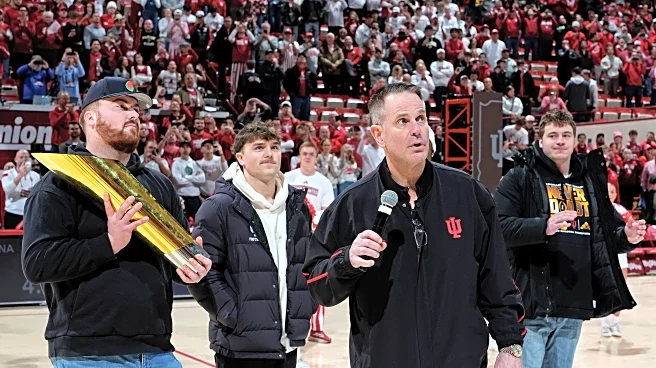What's Happening?
Representative Marjorie Taylor Greene has publicly criticized House Speaker Mike Johnson for the House of Representatives' lack of action during the ongoing government shutdown. Appearing on ABC's 'The
View,' Greene expressed her frustration with the House not being in session, calling it an 'embarrassment.' She emphasized the need for lawmakers to work together to resolve the shutdown and ensure federal employees are paid and programs are funded. Greene also voiced her dissatisfaction with the Republican leadership, accusing them of failing to advance the party's agenda, particularly in areas like healthcare. Her comments reflect broader discontent with the handling of the shutdown and the perceived lack of progress in addressing key issues.
Why It's Important?
Greene's criticism of Speaker Johnson highlights internal tensions within the Republican Party and the challenges of navigating the government shutdown. Her remarks underscore the pressure on congressional leaders to find a resolution and the frustration among lawmakers over the lack of progress. The shutdown has significant implications for federal employees, government services, and public confidence in political leadership. Greene's comments also draw attention to the broader issue of partisan gridlock in Washington, which has hindered legislative action on critical issues like healthcare reform. Her outspoken stance may influence public perception and add urgency to efforts to end the shutdown.
What's Next?
As the shutdown continues, there may be increased pressure on Speaker Johnson and other congressional leaders to negotiate a resolution. Greene's criticism could prompt further discussions within the Republican Party about strategy and priorities, potentially leading to shifts in leadership or policy approaches. The situation may also lead to increased public scrutiny of congressional actions and calls for accountability. If the shutdown persists, it could have lasting impacts on government operations and public trust, prompting discussions about reforms to prevent future shutdowns and improve legislative efficiency.
Beyond the Headlines
Greene's comments reflect broader cultural and political dynamics, including the role of women in leadership and the impact of partisan divisions on governance. Her emphasis on the need for mature, collaborative leadership highlights the challenges of navigating political polarization and the importance of finding common ground. The situation also raises questions about the effectiveness of current political structures and the need for reforms to enhance accountability and responsiveness. Greene's remarks may contribute to ongoing debates about the future of the Republican Party and the role of women in shaping political discourse.









